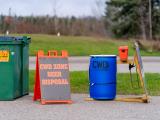Feb 11, 2013
White House warns that sequestration would hurt food safety
If the automatic federal budgets called sequestration take effect on Mar 1, all food safety inspections by the Food and Drug Administration (FDA) and the US Department of Agriculture (USDA) will have to be cut back, the White House warned in a Feb 8 statement. It said the FDA "could conduct 2,100 fewer inspections" at domestic and foreign food processing facilities, and the USDA Food Safety and Inspection Service might have to furlough all employees for 2 weeks. The latter step would bring meat production to a halt, since meatpacking facilities can't operate without USDA inspectors on hand. "These reductions could increase the number and severity of safety incidents, and the public could suffer more foodborne illness, such as the recent salmonella in peanut butter outbreak and the E. coli illnesses linked to organic spinach, as well as cost the food and agriculture sector millions of dollars in lost production volume," the
statement said. It also warned of the effects of budget cuts on a wide range of other government programs and services, including delays in FDA drug approvals and in research supported by the National Institutes of Health. Sequestration is supposed to occur unless Congress comes up with an alternative set of budget cuts and/or tax increased by Mar 1.
Feb 8 White House statement
Related Jul 27, 2012, CIDRAP News story
US, Canada seek comments on risk assessment for Listeria in soft cheese
US and Canadian health agencies are inviting comments on a joint assessment of the risk of getting listeriosis from eating soft-ripened cheeses. The FDA announced the risk assessment in today's Federal Register and set an Apr 29 deadline for receiving comments. The purpose of the risk assessment is to estimate the effects of the microbiologic status of milk, cheese manufacturing steps, and distribution and storage conditions on consumers' risk of invasive listeriosis. A summary of the risk assessment lists slightly different risks for consumers in the United States and Canada, using Camembert cheese as an example. For US Camembert made from raw milk, the report estimates the risk of invasive listeriosis at 1 in 1.2 million servings for elderly people and 1 in 570,000 servings for pregnant women. For Camembert made from pasteurized milk, the respective risks drop to 1 in 136 million servings and 1 in
55 million servings, respectively. For raw-milk Camembert in Canada, the risks are estimated at 1 in 2.6 million servings for elderly people and 1 in 1.1 million servings for pregnant women. The model also suggests that in the United States, 4.7% of raw-milk Camembert servings and 0.7% of pasteurized-milk servings have Listeria contamination.
Feb 11 Federal Register notice
FDA-Canada risk assessment interpretative summary
OIE keeps Brazil's BSE risk status in place
The World Organization for Animal Health (OIE) announced today that its scientific commission, after extensive deliberation, has decided not to withdraw Brazil's "negligible risk" status stemming from the identification of a case of bovine spongiform encephalopathy (BSE) in a cow. The animal's illness was Brazil's first case of BSE, also called "mad cow disease." The cow died in 2010, but the findings weren't known until June 2012 due to a laboratory delay. In a final report on the case on Feb 6, Brazilian officials said tests suggest the cow had an atypical form of the disease that they believe is rare and spontaneous; however, the OIE doesn't recognize atypical BSE as a distinct entity. The commission discussed the case last week at its biannual meeting. The OIE group said the single positive finding doesn't pose a health risk to Brazil or its trading partners, because the animal was destroyed and did not enter the food chain. However, the
commission said it was concerned about Brazil's delay in sending samples for lab confirmation. It requested more information on how the country processes samples and on Brazil's surveillance system for the disease. The OIE said the committee will address the issue again at its next meeting in September.
Feb 11 OIE statement
Feb 7 CIDRAP News scan "Final report on Brazil BSE cow suggests atypical disease"
















